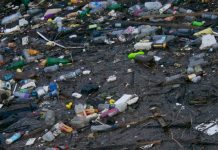On Wednesday, March 25, 2015, the follow-up to the London Conference on the Illegal Trade in Wildlife will take place in Kasane, Botswana.
The landmark London Conference in February 2014 brought together heads and representatives of governments to discuss the rise in the illicit trade in wildlife and its negative social, environmental and economic impacts.
The high-level Kasane meeting will review the status of implementation of the actions agreed as part of the London Declaration.
The London-based Environmental Investigation Agency (EIA) has for three decades been at the forefront of calls for transnational wildlife crime to be properly recognised and addressed, and last year welcomed the outcomes of the London Conference as a strong indication that world leaders were finally getting serious about tackling international wildlife crime.
EIA has prepared a new briefing, High Profit/Low Risk: Reversing the wildlife crime equation, for the Kasane conference. It can be viewed and downloaded at http://eia-international.org/reports/high-profitlow-risk-reversing-the-wildlife-crime-equation.
EIA Executive Director Mary Rice will be addressing the Botswana conference and said: “EIA has been looking for evidence that countries are actually taking action and not just talking when it comes to implementing London Declaration commitments.
“There is still more work to be done to gather and share information on the transnational criminals responsible for trafficking, and to analyse court judgements so we can better understand what needs to be done to strengthen prosecutions.”
WHAT IS THE ILLEGAL WILDLIFE TRADE?
Wealthy consumers in China and elsewhere are investing in tiger and leopard skin rugs, tiger bone wine, elephant ivory carvings, rhino horn and other endangered wildlife products as collectibles, bribes, prestigious gifts and ingredients in traditional medicines. The demand sustains organised crime involvement, fuels corruption and conflict, and finances other forms of serious crime.
For decades, transnational organised criminal networks have profited from wildlife crimes – crimes carrying few risks of detection, prosecution and sanction.
Governments have been talking about adopting more sophisticated enforcement responses for many years but have failed to invest adequately in more proactive measures such as:
• multi-agency cooperation between police, customs, forest and national parks personnel;
• specialist investigation techniques such as covert and electronic surveillance, and controlled deliveries;
• international cooperation such as the timely exchange of intelligence to intercept criminals and seize their assets;
• improving legislation to ensure illegal wildlife trade is treated as serious crime with meaningful penalties as a deterrent, and to enable the confiscation of proceeds of crime;
• committing to endalltrade in ivory, rhino horn and tiger parts (including farmed tiger parts).


























